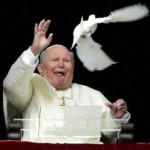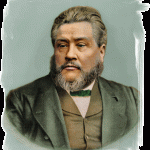In this short blog post, I simply wish to show that indulgences are not a mere historical novelty but a very present and up to date doctrine and practice of the Roman Catholic Church.
From the archives at his website, Dr. Al Mohler writes:
 “Looking to Christianity’s third millennium, Pope John Paul II has declared “The Great Jubilee of the Year 2000?—and indulgences from punishment for sin are a centerpiece of the jubilee celebration. The practice which brought Luther to his break with Rome is once again front and center in Catholic practice as the new millennium approaches.
“Looking to Christianity’s third millennium, Pope John Paul II has declared “The Great Jubilee of the Year 2000?—and indulgences from punishment for sin are a centerpiece of the jubilee celebration. The practice which brought Luther to his break with Rome is once again front and center in Catholic practice as the new millennium approaches.
In “Incarnationis Mysterium,” his bull declaring the jubilee year, the Pope has reopened one of the most difficult issues separating evangelicals and Roman Catholics, spawning a “Y2K” crisis of immense theological significance.
Pope Clement VI was the first to declare that the Roman church possessed a “Treasury of Merit” stored up by the merits of the saints and available at the disposal of the Church. Clement’s 1343 papal bull declaring a jubilee year opened the door for the offer of indulgences, which became a widespread practice within just a few years. Indeed, the medieval church largely financed its expanding operations through the sale of indulgences and masses for the dead. In the 16th century, Pope Julius II sought to finance the building of St. Peter’s Basilica in Rome through the sale of indulgences—a practice which soon burned indignation into the heart of a young Augustinian monk named Martin Luther.
 It was the appearance of Johannes Tetzel, a Dominican monk, selling indulgences for the building of St. Peter’s that so offended Martin Luther. The more Luther heard of Tetzel’s preaching, the more he saw the evil of the practice. The famous “Ninety-Five Theses” Luther nailed to the Wittenberg church door opened with an attack on the theological heart of the indulgences issue. His words still thunder through the centuries: “Those who believe that they can be certain of their salvation because they have indulgence letters will be eternally damned, together with their teachers” [Thesis 32]. “Any truly repentant Christian has a rich right to full remission of penalty and guilt, even without indulgence letters” [Thesis 36].
It was the appearance of Johannes Tetzel, a Dominican monk, selling indulgences for the building of St. Peter’s that so offended Martin Luther. The more Luther heard of Tetzel’s preaching, the more he saw the evil of the practice. The famous “Ninety-Five Theses” Luther nailed to the Wittenberg church door opened with an attack on the theological heart of the indulgences issue. His words still thunder through the centuries: “Those who believe that they can be certain of their salvation because they have indulgence letters will be eternally damned, together with their teachers” [Thesis 32]. “Any truly repentant Christian has a rich right to full remission of penalty and guilt, even without indulgence letters” [Thesis 36].
Later, Luther was to decry the “shameful outrage and idolatry of indulgences,” which he had come to see as a slander to the atoning work of Christ and a denial of justification by faith. The Reformation revealed the great divide between the Reformers and the Catholic church on issues as central as grace, law, justification, faith, and authority in the church, but it was the practice of granting indulgences which sparked the explosion.
John Paul II’s recent declaration did not come as a shot out of the blue. In fact, indulgences were affirmed by the Council of Trent, called in the 16th century to answer the Reformation. As recently as 1967 Pope Paul VI released an encyclical defining an indulgence as “the remission in the sight of God of the temporal punishment due to sins which have already been blotted out as far as guilt is concerned; the Christian believer who is properly disposed gains it on certain conditions with the help of the Church which, as the minister of redemption, authoritatively dispenses and applies the treasury of the satisfactions of Christ and the saints.” He also extended this to the dead, whose punishment in purgatory can be relieved through the intercession of the living.
Extending the matter even further, in 1985 John Paul II allowed indulgences to be granted to those watching a service by television, who otherwise met the requirements of those physically present. In his jubilee bull, the Pope listed a wide range of acts which could earn an indulgence, ranging from a sacred pilgrimage to Rome, the Holy Land, or to the cathedral or other stipulated church in their area, or by acts of service to others, by even one day of abstaining from “unnecessary consumption” (including alcohol or tobacco), or by donations to the poor.
Evangelicals shocked by the Pope’s new statement should be reminded that the Roman Catholic church has never repudiated indulgences, though it did seek to reform the practice, and to clarify that the indulgence removes punishment but not guilt. As in the 16th century, the practice of granting indulgences clarifies the continuing gulf between evangelical and Catholic conviction on central doctrines.
While admiring the Pope’s brave fight in defense of human life and human rights, his courageous confrontation with modernity, and his stalwart insistence on the objective reality of truth, evangelicals must insist that the church has no power to forgive sin, that the work of Christ is complete, and that the entire complex of purgatory, indulgences, penance, and the treasury of merit is utterly without biblical foundation.
There is but one “only true indulgence,” insisted Luther, and that is the Gospel of Jesus Christ. Or, as the Apostle Paul wrote the church in Rome: “Much more then, having now been justified by His blood, we shall be saved from the wrath of God through Him” [Romans 5:9].”
 Bringing this issue up to date, the present Pope Benedict XVI places great importance on indulgences. Evidence of this is found in the following articles:
Bringing this issue up to date, the present Pope Benedict XVI places great importance on indulgences. Evidence of this is found in the following articles:
one from the BBC here
and another from the New York Times here.
In contrast, the Scripture says, “Therefore, since we have been justified by faith, we have peace with God through our Lord Jesus Christ.” (Romans 5:1)
Semper Reformanda.
P.S. For further discussion concerning the Roman Catholic doctrine of indulgences, see the article “The power is not in Joseph’s pants.”

 “… precious and very great promises.” – 2 Peter 1:4
“… precious and very great promises.” – 2 Peter 1:4 REJECTION IS NOT REFUTATION
REJECTION IS NOT REFUTATION